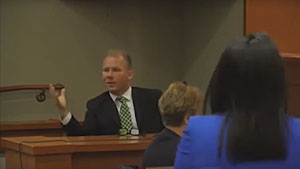

The Expert: Dr. James Shaffer, a Florida-based pulmonologist and expert in sleep disorders, testifies regarding whether staff members appropriately cared for the patient.

In a 2015 medical malpractice trial out of Georgia, Dr. James Shaffer, a pulmonologist and sleep medicine specialist, testifies regarding the plaintiff’s allegations of negligence that led to the death of a developmentally disabled patient during a sleep study.
This clip focuses on the “policy and procedures” usually set out in writing by the facility’s medical director to deal with emergency situations such as occurred in this case. To begin with, the expert explains that the policy’s written documentation was flawed by a missing word that was critical to the understanding of when and how the policy should be implemented. The expert could not guess at what the word was meant to be, but could only state that, “Something is wrong,” with the instructions, making the policy unclear.
Shaffer then describes how pulse oximetry measurements are used along with other signs and symptoms of difficult breathing to determine when an emergent situation is occurring. These measurements of oxygen saturation in the bloodstream are constantly observed and available to the clinic’s healthcare workers, yet they are not addressed at all in the policy manual. The usual range of oxygen saturation is 94-100%. If the measurement drops to 80% as it did here, that is a very significant deviation from the normal amount of oxygen in the blood. In this case, the patient was conversive and comfortable before going to sleep for 6 hours. When he awoke, his oxygen saturation had fallen to dangerous levels, he was having difficulty breathing, and was very anxious. This sudden change, the expert says, represented an emergent situation.
Under these circumstances, there is nothing that can be done in the sleep lab to help this patient, so it does not make sense to delay action and see if he may improve. The expert testifies that the policy to deal with a patient experiencing shortness of breath calls for technicians to call 911 first and then the medical director. The technicians should be educated to recognize that someone is having difficulty with respiration, and it is the medical director who, as the “team captain,” must develop a culture of safety and accuracy. This requires regular interaction with sleep clinic techs to educate them and develop a system that is “foolproof.” so that a situation such as this one will not happen.
Deposition testimony from one of the technicians indicated that she did not know how to recognize if someone was having difficulty with their breathing. Shaffer testifies that it is the medical director’s responsibility to be sure that the technician knows how to make this assessment, especially since the doctor is not always present when the patient is being studied.
He also pointed out that one technician was concerned that elevating the head of the bed would nullify the test results. It turns out that elevating the head of the bed is appropriate since this is a situation that is commonly found in patients with sleep problems. “This is so disconnected from how we are supposed to do it, that in my mind’s eye, it represented more evidence that their lack of training and lack of familiarity with the concepts of what they were doing was pretty flagrant.”
The jury concurred with the expert, awarding $20.5 million, with 60% of liability ultimately apportioned to the company contracted to run the sleep center.
Gary Gansar, MD, is residency-trained in general surgery. He served as Chief of Surgery and Staff at Elmwood Medical Center and on the Medical Executive Committee at Touro Infirmary and Mercy Hospital in New Orleans, LA. Dr. Gansar was Board Certified in general surgery while in active practice. He joined AMFS in 2015 as a Physician Medical Director.
The medical expert witness partner for attorneys serious about building a winning case
AMFS is your trusted source for highly-qualified medical expert witnesses. After pioneering the field nearly three decades ago, we’re continuing to redefine medical expert witness services by providing value far beyond a referral alone.
Our Physician Medical Directors know what it takes to build a strong case. Our medical expert witnesses leave no doubt. And our case managers streamline billing and logistics every step of the way, letting you focus on what you do best: constructing your winning case. Explore why AMFS clients expect more from their medical expert witnesses—and get it.
